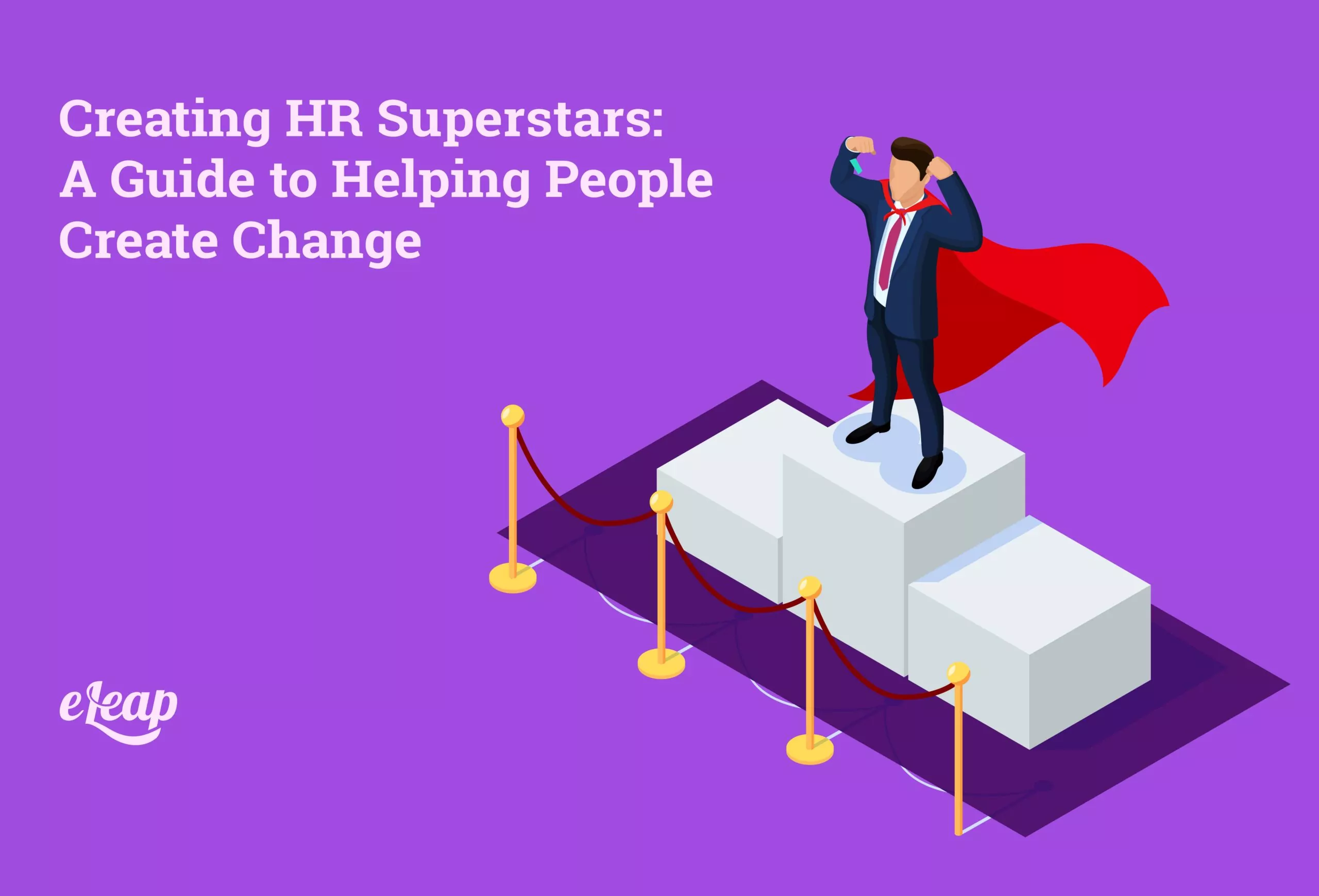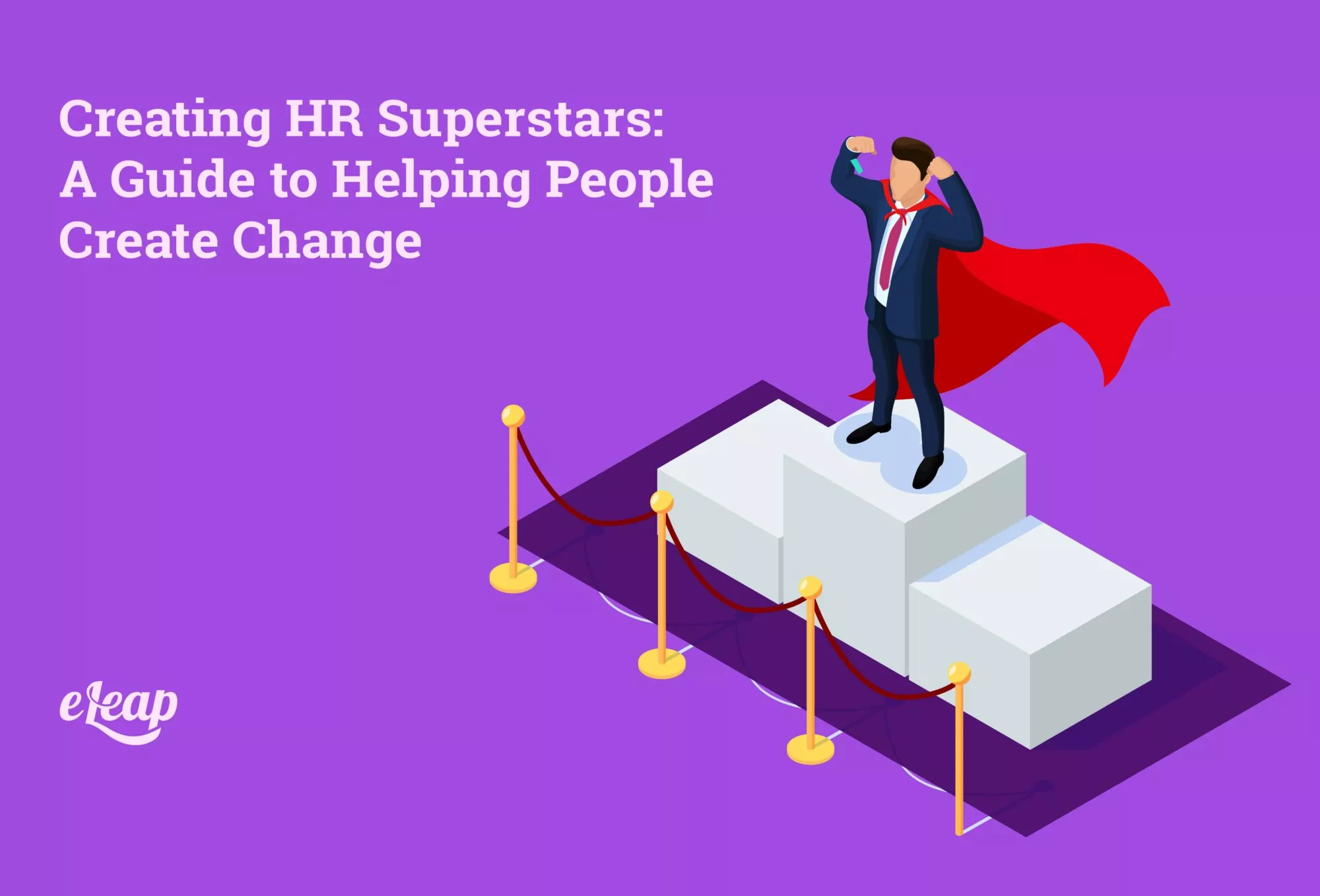Creating HR Superstars: A Guide to Helping People Create Change

When you think of your organization’s human resources department, what do you see? Is it an administrative team? If so, it’s time to rethink things.
HR is many things. And, while it certainly has administrative functions, it’s so much more. In fact, your human resources team plays a strategic function in the organization’s growth and success.
Of course, unlocking that potential can be challenging. That is especially true if your organization has always used HR as an administrative tool and never really focused on strategic functions. The good news is that with the right steps and a little preparation, you can create HR superstars and empower people to evoke needed positive change.

The Need for HR Superstars
First, let’s address one question: does your organization really need HR superstars? Aren’t things fine the way they are? Well, questions about your willingness to challenge the status quo aside, realize that transforming HR from administrative tool to strategic resource can have some pretty profound implications for your organization.
With an empowered human resources department, you can achieve:
· Improved employee engagement
· Enhanced diversity, equity, inclusion, and belonging (DEIB)
· The creation of policies and procedures that make sense and move the organization forward
· The creation of a culture that embraces values rather than rules and blind following of procedures
A Case Study
The incident made international headlines as a doctor was dragged down the aisle and unceremoniously removed from a United Airlines flight in 2017. Dr. David Dao was 69 years old and his crime was simple: he’d refused to give up his seat on the flight to make room for United staff members who needed to fly. In recompense, the airline had ultimately offered $800 in flight vouchers, but Dao refused because it was the last flight of the day and he had to be at work at the hospital the next day.
United staff had no choice but to follow the policy in place for the company at the time, which was to have Dao forcibly removed. A call to airport security did the trick, and during the scuffle, Dr. Dao’s face hit the chair armrest, bloodying his lip and knocking him unconscious. He was dragged off the plane while other passengers filmed it all.
The results of this horrifying incident were swift and stark. Consumers were in an uproar. The press spread the story far and wide. Oscar Munoz, United’s CEO, was even called to testify before Congress regarding the incident, the company’s policies, and Munoz’s tepid apologies.
There was one more result, though: United was forced to change policies that forced employees to follow the rules at all times and deprived them of their autonomy. In their place, the airline adopted new policies that focused on employees’ ability to make commonsense decisions even if the company’s policies differed.
How does Dr. Dao’s story tie into your organization’s HR department? It really comes down to creating policies and procedures that empower rather than robbing employees of their autonomy.
The Need for Autonomy
For most of US history, autonomy hasn’t been prized by CEOs and other decision-makers. They valued those who played by the rules, who kept their heads down, and who focused on doing what they were told. It was all about minimizing disruptions and maintaining production levels and quality.
However, today’s world is dramatically different. Organizations can no longer afford for employees to blindly follow policies and procedures that might be dubbed tone-deaf at best. It’s also important to understand that consumers today have more power than ever before. Dr. Dao’s situation was resolved in an undisclosed settlement amount and the firing of the two security guards in question. It also saw airlines offering up to $10,000 in incentives for passengers to change seats and the complete industry reversal of overbooking, the strategy that led to the problem in the first place.
Autonomous, empowered team members help organizations avoid these situations in the first place. They’re confident, productive, engaged, and motivated. They require less supervision to accomplish their tasks, feel a deep sense of ownership and belonging with the organization, and contribute new ideas regularly that help foster growth and agility.
However, without an empowered HR department, it’s difficult to create autonomous, empowered employees. So, what should you do?
The Right Strategies for HR
Creating an empowered HR department requires rethinking some of the primary strategies in place.
Feedback: A culture of feedback ensures a constant flow of information that can be used to adjust and change course as necessary. HR can help create positive feedback loops that connect employees to managers and executives.
Belonging: HR can help foster a greater sense of inclusion and belonging across the organization. This can be done through a wide range of tools, from incentive programs to rewards programs to career path charting and training/development programs.
Decision-Making: To empower employees, HR must have a seat at the table. The C suite must realize that human resources should have decision-making capabilities to foster greater transparency and create programs that achieve necessary goals.
Active Listening: For HR leaders, active listening is perhaps the most important skill to develop. This requires more than simply listening and responding appropriately. It requires asking further questions to probe deeper.
Positive Intent: Problem-solving often involves suspicion of ill intent. That tints any problem-solving process. Instead, HR professionals should assume that everyone involved had positive intent, which will foster better transparency and more informed decision-making.
Empowering HR Empowers Your Organization
More and more, HR should be seen as a strategic part of the business, and not merely an administrative aspect. An empowered human resources department empowers the entire organization through greater transparency, improved communications, and helping employees feel included and that they belong. HR superstars can also help identify company policies and procedures that no longer work (if they ever did) and create empowered, autonomous employees capable of making their own decisions that propel the company forward.